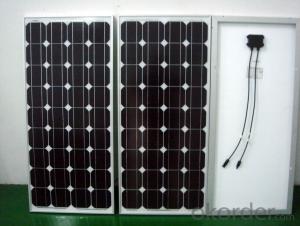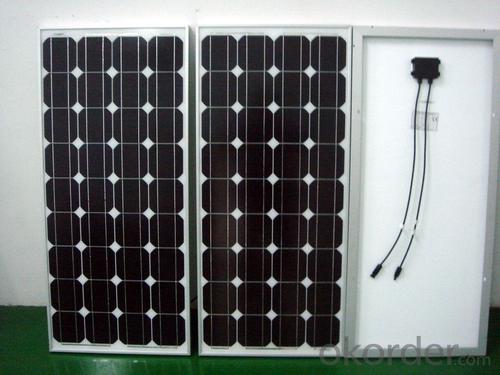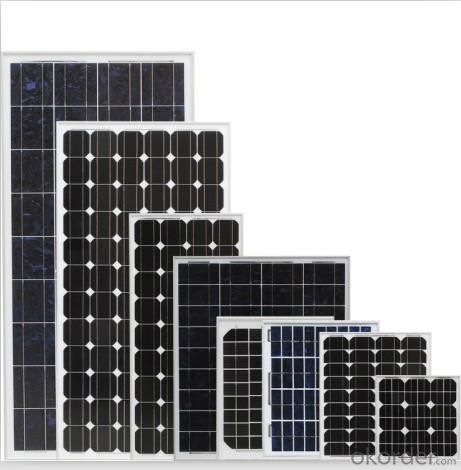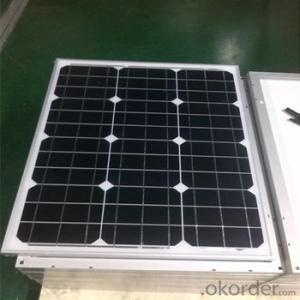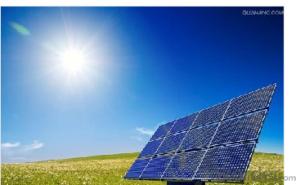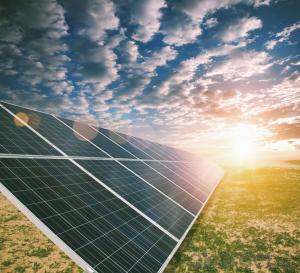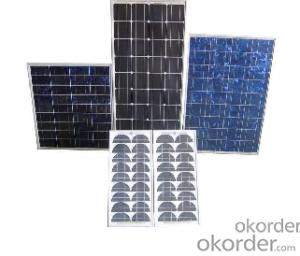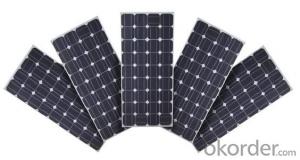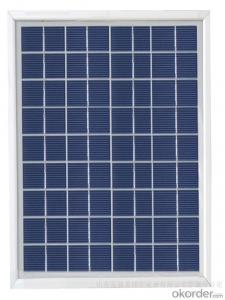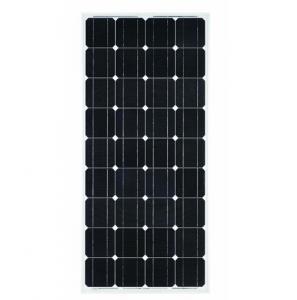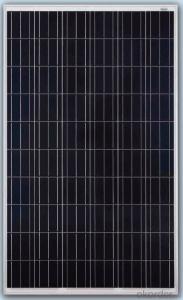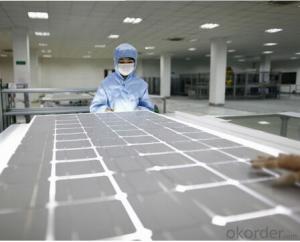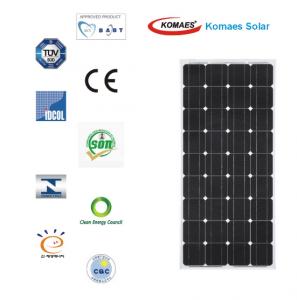130w/135w Solar Panels With Controller, TUV IEC MCS CEC IDCOL SONCAP Certified
- Loading Port:
- Shanghai
- Payment Terms:
- TT OR LC
- Min Order Qty:
- 1000 watt
- Supply Capability:
- 100000000 watt/month
OKorder Service Pledge
OKorder Financial Service
You Might Also Like
- TUV IEC, MCS (UK), CE, CEC (Australia), INMETRO, IDCOL, SONCAP CERTIFIED
- [EU ANTIDUMPING DUTY-FREE]
- PROFESSIONAL SOLAR PANEL MANUFACTURER SINCE 2004
FEATURES
`Long Service Life
`High Efficency Solar Cells
`Special Aluminum Frame Design
`High Transmission,Low Iron Tempered Glass
`Advanced Cell Encapsulation
APPLICATIONS
`Solar power stations
`Rural electrification, Small home power systems
`Power supply for traffic, security, gas industry
`12V and 24V battery charging system
`Other industrial and commercial applications
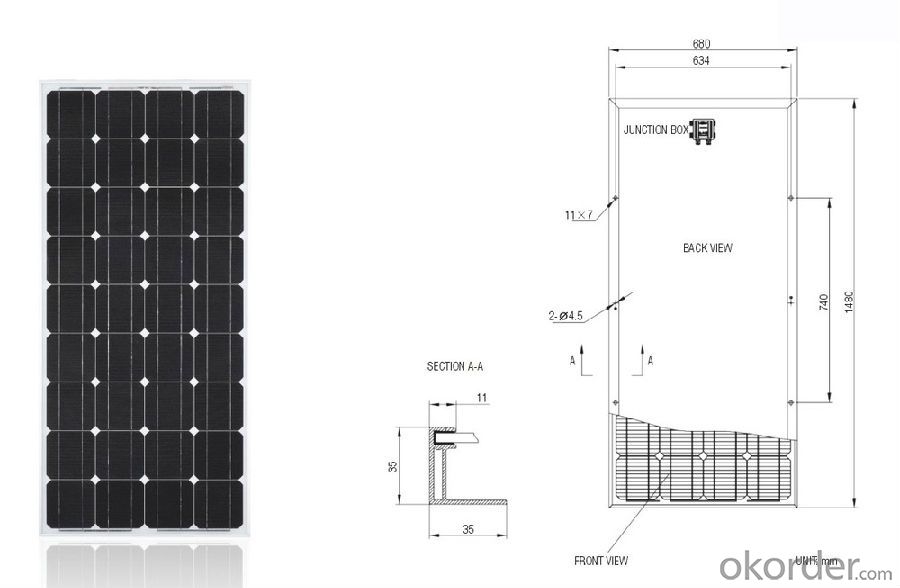
ELECTRICAL CHARACTERISTICS | ||||||
Model Number | KM130(6) | KM135(6) | KM140(6) | KM145(6) | KM150(6) | |
Maximum Power as per STC | Pmax(W) | 130 | 135 | 140 | 145 | 150 |
Power Tolerance | % | ±3% | ||||
Maximum Power Voltage | Vm(V) | 17.96 | 18.14 | 18.36 | 18.15 | 18.28 |
Maximum Power Current | Im(A) | 7.26 | 7.45 | 7.65 | 7.99 | 8.21 |
Open Circuit Voltage | Voc(V) | 21.6 | 21.74 | 21.96 | 21.72 | 21.9 |
Short Circuit Current | Isc(A) | 7.83 | 8.04 | 8.17 | 8.69 | 8.93 |
Maximum System Voltage | VDC | 1000 | ||||
Cell Efficiency | % | 15.0 | 15.5 | 16.1 | 16.7 | 17.3 |
Module Efficiency | % | 12.9 | 13.4 | 13.9 | 14.4 | 14.9 |
Cells per Module | Pcs | 36 | ||||
Cell Type | Monocrystalline silicon | |||||
Cell Size | mm | 156 x 156 | ||||
Bypass Diodes | Pcs | 10Amp, 2 pcs | ||||
Max. Series Fuse Rating | A | 10A | ||||
Temperature coefficient of Isc | %/°C | 0.05 | ||||
Temperature coefficient of Voc | %/°C | -0.35 | ||||
Temperature coefficient of power | %/°C | -0.47 | ||||
NOCT- Nominal operating cell temperature | °C | 47 ± 2 | ||||
Operating Temperature | °C | -40 ~ +85 | ||||
MECHANICAL CHARACTERISTICS | ||||||
Dimensions | mm | 1480 x 680 x 35 | ||||
Weight | Kg | 11.6 | ||||
Type of Junction Box | TUV certified, IP65 | |||||
Cable Type, Diameter | - | |||||
Connector | - | |||||
Tempered Glass | 3.2 mm, high transmission, low iron | |||||
Packing
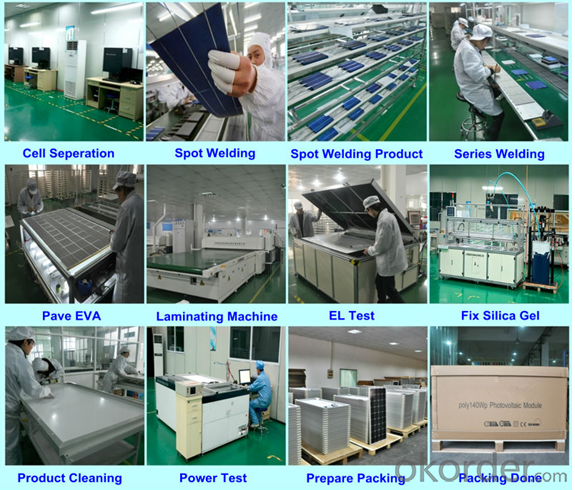
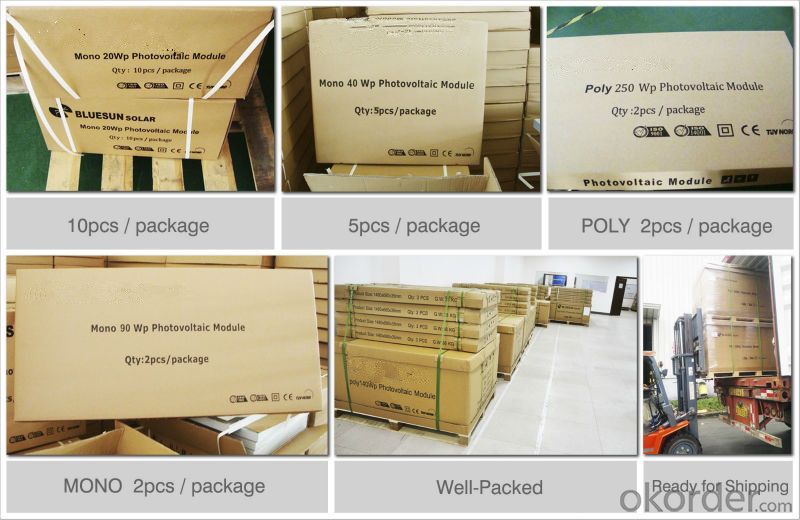
FAQ
1. What kind of Solar Cells does it have
---poly crystalline 156*156mm and 125*125mm or mono 125*125mm and 156*156mm
2. Is the front panel Glass or Plastic
---Tempered glass 3.2mm thickness or adjust to what you need, Light transmittance up to 95%.
3. Does it meet Europe Standards for Solar Energy
---This is TUV approval products, all the producing procedure apply TUV&UL.
4. What is the Efficiency level
--- Between 16-18.9% for solar cells.
5. What is the Nominal Voltage
--- 18v 20v 24v 36v 30v 48v , and so on, we can adjust to what you need.
6. What is the Warranty Period, How many years?
Power efficiency warranty:
---90% in 10 years; 80% in 25 years.
- Q: Can solar panels be installed in a desert environment?
- Yes, solar panels can be installed in a desert environment. In fact, deserts are often ideal for solar panel installations due to their high levels of sunlight and minimal cloud cover. The dry climate also helps to minimize dust buildup on the panels, making maintenance easier.
- Q: Can solar panels be installed on a pergola or shade structure?
- Yes, solar panels can be installed on a pergola or shade structure. In fact, installing solar panels on a pergola or shade structure can provide both shade and renewable energy generation, making it a practical and efficient solution for maximizing space and reducing energy costs.
- Q: If a solar panel has a power rate of 80 Watts and efficiency of lets say 30%. Does that mean the maximum power this solar panel can generate is (30/00)*80=54 Watts or its just 80 Watts?
- Solar panels are tested in a lab that has a light the produces 000 watt/hrs per square meter. In these conditions your panel will produce 80 watt/hrs. If you would like to know what it does in really world conditions you have to find the sun-hours in your given area. A sun-hour is basically how many watt/hrs hit a square meter in a day. This number changes based on time of year, orientation, and temperature. Here in Fairbanks Alaska if the panel was at 90 degrees facing true south in October (.9 sun-hours) It would produce 80 X .9 X .8 (20% efficiency loss due to wires and controllers) it would produce 273.6 watt/hrs on average each day.
- Q: How do solar panels impact the electrical grid?
- Solar panels impact the electrical grid by providing renewable and clean energy, reducing the dependency on fossil fuels. They contribute to a more balanced and sustainable energy mix, lowering carbon emissions and promoting energy independence. However, their intermittent nature can pose challenges in grid integration and stability, requiring efficient energy storage and grid management solutions.
- Q: Can solar panels be used in areas with high levels of seismic vibrations?
- Yes, solar panels can be used in areas with high levels of seismic vibrations. However, it is crucial to ensure that the solar panel installations are engineered and constructed to withstand the potential impact of seismic activity. Proper structural design, adequate mounting systems, and appropriate anchoring techniques can help mitigate the risks associated with earthquakes or other seismic events. Additionally, regular inspections and maintenance can help identify and address any damages caused by seismic vibrations to ensure the continued functionality of the solar panels.
- Q: The first solar panel that creates energy from UV rays... who created it
- The first photovoltaic cell was developed at Bell Labs in 954. The team included G.L. Pearson, C.S. Fuller, and D.M. Chapin. A panel is composed of many cells. They respond to a wide range of wavelengths, not just UV.
- Q: Can solar panels be installed on water bodies or reservoirs?
- Yes, solar panels can be installed on water bodies or reservoirs. This is known as floating solar or floating photovoltaic (FPV) technology. It involves mounting solar panels on buoyant platforms on the surface of the water. This approach offers several benefits, including reduced land requirements, increased energy generation due to the cooling effect of water, and reduced evaporation from the water body.
- Q: Can solar panels be installed on a community center or social gathering place?
- Yes, solar panels can certainly be installed on a community center or social gathering place. In fact, these locations are ideal for solar panel installation as they often have large roof spaces that can accommodate a significant number of panels. Solar energy can help power the community center, reducing electricity costs and environmental impact, while also setting a positive example for the community in terms of sustainability and renewable energy.
- Q: Im doing a science project and I need to know what gases or liquids a solar panel can make that is not friendly to the environment. Please name all the gases and liquids and explain how they damage the environment. It would be most likely that you will get best answer if you find all the bad things about solar energy and explain why they are bad and how they affect nature. that would be helpful to. Thank you
- Radition
- Q: Can solar panels be installed on mobile homes?
- Yes, solar panels can be installed on mobile homes.
Send your message to us
130w/135w Solar Panels With Controller, TUV IEC MCS CEC IDCOL SONCAP Certified
- Loading Port:
- Shanghai
- Payment Terms:
- TT OR LC
- Min Order Qty:
- 1000 watt
- Supply Capability:
- 100000000 watt/month
OKorder Service Pledge
OKorder Financial Service
Similar products
Hot products
Hot Searches
Related keywords
